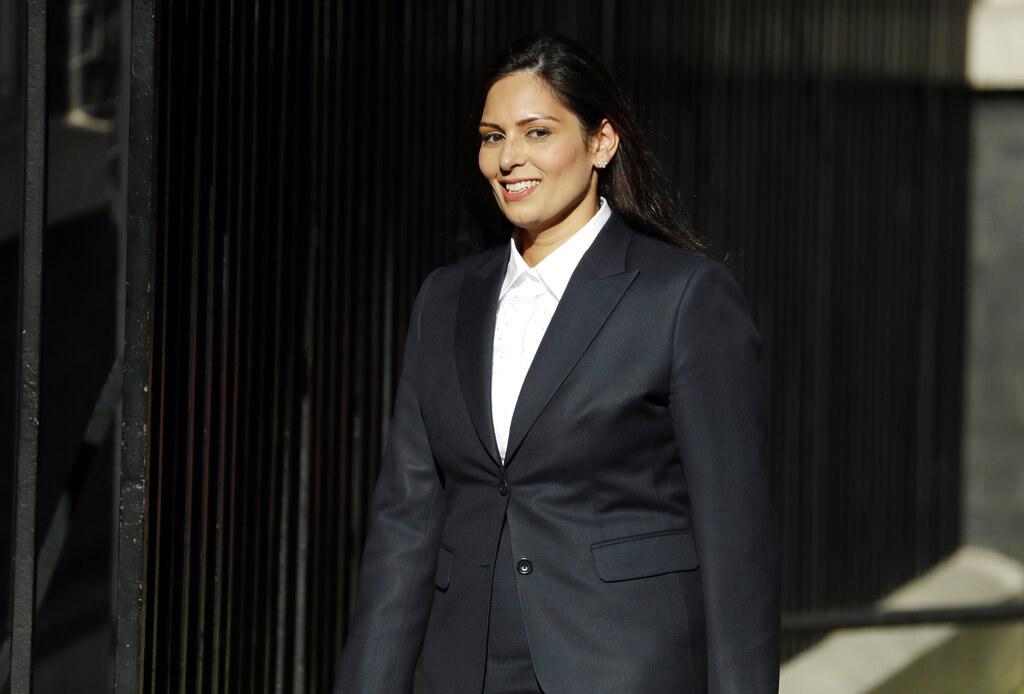She is accused of flinging a folder at an aide, hitting the staffer in the head. She reportedly told another offending underling to “get out of my face” and castigated her staff as “useless” adding an f-bomb for good measure.
The allegations of abusive behaviour by UK home secretary Priti Patel — all of which she denies — have made her a lightning rod in Prime Minister Boris Johnson’s new cabinet, a ready-made villain for critics who accuse this hard-line Brexit government of running roughshod over British customs and institutions.
But when a respected career civil servant resigned last week because of what he claimed was a “vicious and orchestrated” campaign against him by Patel, what began as a juicy boss-from-hell story turned into a metaphor for Johnson’s broader tensions with Britain’s much vaunted civil service.
The feud between a populist leader and an entrenched bureaucracy carries echoes of the Donald Trump administration’s war on the so-called “deep state”, with Johnson’s scruffy, iconoclastic adviser Dominic Cummings playing the role of Stephen K. Bannon, Trump’s one-time in-house provocateur.
In this case, the civil servant, Philip Rutnam, who served as the permanent secretary in the Home Office, said Patel’s behaviour was part of a pattern of bullying civil servants that needed to be called out.
His mutiny came as Cummings is moving aggressively to shake up the bureaucracy, seeking to inject new people — especially ones with the math and science skills he considers lacking in senior civil servants — and rooting out those he deems hostile to Brexit.
“Civil servants are under a lot of pressure,” said Bronwen Maddox, director of the Institute for Government, a think tank in London. “There is an intolerant tone in this government of, ‘You’re on our side or you’re not.’ The impartiality of the civil service is under question in a way that it hasn’t been.”
With Rutnam’s bitter public exit, which he promised to follow with a lawsuit against the Home Office, a feud that had been brewing behind closed doors spilled into the open. It was a startling break with decorum for the civil service, in which disputes are worked out privately and officials like Rutnam shun the limelight.
So far, Johnson has backed up Patel, who is a loyal political ally and a full-throated advocate for his project of leaving the European Union. As home secretary, her mandate includes overhauling Britain’s immigration system to implement a points-based system for admitting foreigners.
Among Rutnam’s offences, people with knowledge of the situation said, was warning Patel how unrealistic it was to set up such a system in less than 10 months. While Patel has few defenders outside Johnson’s party — and faces a government investigation of her conduct — even her critics said they understood the pressures she faced, as the leader of a front-line ministry in a government that is carrying out radical changes in the name of getting Brexit done.
Moreover, Johnson’s aides are probably not wrong to suspect that on balance, most civil servants would have preferred that Britain never left the European Union. Many are weary after serving Johnson’s predecessor, Theresa May, who promised to deliver Brexit but went about it in a chaotic and contradictory way that sowed confusion in the bureaucracy.
“Cummings is right to think it’s a problem,” said Jonathan Powell, who served as chief of staff to Prime Minister Tony Blair. “But if he was going to get rid of them, he would have to sack the entire civil service, because in their hearts, they believe that leaving the European Union was a bad idea.”
New Prime Ministers, Powell said, typically come into office determined to overhaul the civil service — and they typically fail.
In 1997, Blair and his aides were convinced that after 18 years of Conservative Party rule, the civil service would be implacably hostile to his Labour Party agenda. In 1999, he complained about the “scars on my back” from two years of battling with Britain’s public sector, a broader category that includes teachers, doctors and other public employees.
But Powell said that to his surprise, the civil service showed an almost preternatural capacity to fall in behind its new masters.
“We thought they would be Tories,” he said. “In fact, they bent over backward to carry out our manifesto.”
Such a lack of partisanship is one of the defining characteristics of Britain’s civil service, which encompasses roughly 450,000 people who work in the upper and middle levels of government agencies from the Treasury to the ministry of defence.
Chosen through a competitive exam process, civil servants pride themselves on their skill in pulling the levers of government and in offering unvarnished advice to a changing cast of politically appointed ministers.
Even advocates for the civil service acknowledge its shortcomings. Along with being nonpartisan, civil servants are, by tradition, not held accountable for the performance of their departments or agencies. That can complicate their relationship with hard-driving ministers like Patel.
Defenders of Rutnam, the permanent secretary who clashed with her, said he was unflappable, honest and diligent. But others pointed to problems during his tenure at the Home Office, which became embroiled in a scandal over the wrongful deportation of Caribbean immigrants.
Educated at Cambridge and Harvard, but virtually invisible until he went before cameras last week to deliver his emotional resignation, Rutnam was a civil servant out of central casting.
To Cummings, that is the problem. In a blog post in January, he complained that the civil service had too many “Oxbridge English graduates who chat about Lacan at dinner parties with TV producers and spread fake news about fake news”.
Emboldened after the Conservative Party’s thumping victory in the general election last December, Cummings has said he wants a broader overhaul of the civil service. He posted a recruiting call for data analysts, software developers, economists, and the like, to work as political advisers and “maybe as officials”.










